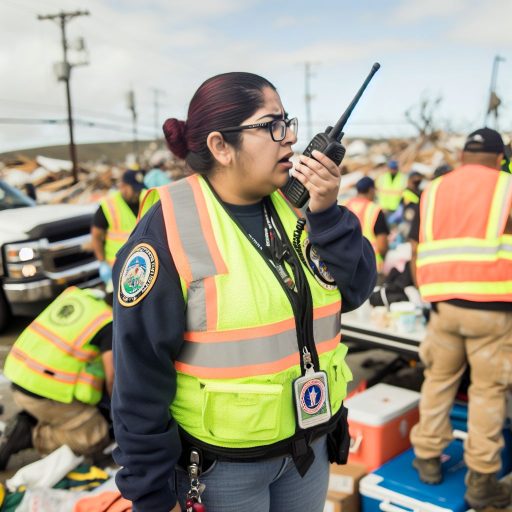Private Investigators: Skills Beyond Surveillance
Private investigators play a crucial role in gathering information for various clients, including individuals, businesses, and law firms.
Brief Overview
Private investigators utilize a wide range of skills, such as research, analysis, and interviewing, to uncover facts and provide evidence.
Common Misconception
One common misconception about their job is that private investigators only conduct surveillance activities.
However, their skill set goes beyond just monitoring.
Skills required beyond surveillance
Private investigators are professionals who go beyond just surveillance to uncover crucial information for their clients.
In addition to surveillance, they require a wide range of skills to effectively carry out their investigative work.
Strong analytical skills
- Private investigators must possess strong analytical skills to piece together information from various sources.
- They need to be able to think critically and connect the dots to solve complex cases.
- Analytical skills help them identify patterns, inconsistencies, and potential leads in their investigations.
Proficiency in research methods
- Private investigators need to be adept at conducting thorough research using both online and offline resources.
- They must be able to navigate public records, databases, and other sources of information to gather evidence.
- Proficiency in research methods helps them obtain accurate and relevant information to support their findings.
Excellent communication skills
- Private investigators must have excellent communication skills to interact effectively with clients, witnesses, and other parties.
- They need to be able to ask the right questions, listen attentively, and convey information clearly and concisely.
- Communication skills are essential for building rapport, gaining trust, and conveying findings in a professional manner.
Private investigators need a diverse set of skills beyond surveillance to be successful in their field.
By combining strong analytical skills, proficiency in research methods, and excellent communication skills, they can effectively uncover the truth and provide valuable insights to their clients.
Importance of Critical Thinking
Private investigators often deal with complex cases that require critical thinking skills.
Critical thinking helps investigators analyze information, make connections, and draw conclusions.
Without critical thinking, investigators may miss important details or fail to solve cases effectively.
Ability to Connect Dots and Solve Complex Cases
Private investigators must be able to connect seemingly unrelated pieces of information to solve cases.
This ability allows investigators to see patterns, identify leads, and ultimately solve complex mysteries.
Connecting dots requires critical thinking skills, attention to detail, and a sharp analytical mind.
Examples of Critical Thinking in Action
Consider a case where a private investigator is hired to track down a missing person.
Through critical thinking, the investigator reviews the person’s habits, connections, and recent activities.
By connecting the dots between these details, the investigator is able to locate the missing person successfully.
In another scenario, a private investigator is hired to investigate possible fraud within a company.
Using critical thinking skills, the investigator carefully examines financial records, interviews employees, and reviews company policies.
Through this process, the investigator is able to uncover evidence of fraudulent activities and provide a comprehensive report to the client.
Transform Your Career Today
Unlock a personalized career strategy that drives real results. Get tailored advice and a roadmap designed just for you.
Start NowThese examples demonstrate how critical thinking is essential for private investigators to solve cases effectively and deliver results.
You Might Also Like: Collaboration Between School Resource Officers and Staff
Adaptability is Key
Private investigators must possess the ability to adapt to various situations and environments.
Challenges of the Job
They often find themselves in unfamiliar territory, requiring them to quickly adjust their investigative strategies.
Resourcefulness
An adaptable investigator can think outside the box to gather crucial information for their clients.
Changing Scenarios
As cases evolve, they need to be flexible and open-minded in exploring new avenues of investigation.
Thinking on Their Feet
Private investigators must have the mental agility to assess situations quickly and make informed decisions.
Quick Decision Making
In high-pressure scenarios, they need to think fast and prioritize tasks effectively.
Problem-Solving Skills
Being able to think on their feet allows investigators to come up with creative solutions to complex problems.
Critical Thinking
They must analyze information rapidly and draw logical conclusions to move the investigation forward.
Handling Unexpected Situations
Given the unpredictable nature of their work, private investigators must remain calm and composed in unexpected situations.
Stress Management
Dealing with unexpected challenges requires emotional intelligence and the ability to stay level-headed.
Conflict Resolution
They need to defuse tense situations with tact and diplomacy to ensure a successful investigation.
Risk Management
When faced with danger, they must assess risks and take necessary precautions to safeguard themselves and others.
Discover More: TSA Officer Career Path: Opportunities for Advancement
Utilization of technology
Technology plays a crucial role in the work of private investigators.
It enables them to gather information efficiently and effectively.
By leveraging various tools and gadgets, investigators can conduct thorough research, surveillance, and analysis to provide accurate results.
- GPS tracking devices
- Cell phone tracking software
- Advanced surveillance cameras
- Computer forensics tools
- Database search engines
Importance of staying up-to-date with latest investigative tools
Private investigators must constantly adapt to the ever-changing landscape of technology.
Staying up-to-date with the latest investigative tools is crucial to staying relevant and competitive in the field.
Transform Your Career Today
Unlock a personalized career strategy that drives real results. Get tailored advice and a roadmap designed just for you.
Start NowBy investing in new technology, investigators can enhance their capabilities and deliver better results for their clients.
- Regular training and certification
- Networking with professionals in the industry
- Attending conferences and workshops
- Subscribing to industry publications and blogs
- Exploring new software and gadgets
How technology aids in investigations
Technology has revolutionized the way private investigators conduct their work.
It has made investigations faster, more accurate, and more efficient.
By harnessing the power of technology, investigators can uncover crucial evidence, track individuals, and gather information that was previously inaccessible.
- Remote surveillance capabilities
- Data mining and analysis tools
- Real-time monitoring systems
- Secure communication platforms
- Advanced background check services
Delve into the Subject: Emergency Management Director: Developing Leadership Skills

Ethical Considerations
When it comes to private investigations, ethical considerations are of the utmost importance.
Private investigators must always adhere to a strict code of ethics to maintain their credibility.
Conducting investigations with integrity and honesty is essential in this profession.
Any unethical behavior can not only tarnish the investigator’s reputation but also jeopardize the case.
Upholding Ethical Standards in Investigations
Private investigators are expected to follow ethical standards set by professional organizations.
These standards include honesty, integrity, respect for privacy, and compliance with the law.
Investigators should always act in the best interest of their clients while upholding ethical principles.
Maintaining professionalism and integrity throughout the investigation process is crucial.
Ensuring Privacy and Confidentiality of Clients
Privacy and confidentiality are non-negotiable in the world of private investigations.
Investigators must handle sensitive information with the utmost care and discretion.
Clients trust investigators to safeguard their privacy and keep their personal matters confidential.
Protecting client information from unauthorized disclosure is a top priority for investigators.
Uncover the Details: Parole Officer: Fieldwork vs. Office Work
Case study: Notable private investigator and their successful techniques
Private investigators are known for their exceptional skills beyond surveillance.
One such individual is Detective Jane Smith, who has a track record of solving complex cases.
Transform Your Career Today
Unlock a personalized career strategy that drives real results. Get tailored advice and a roadmap designed just for you.
Start NowSmith’s success can be attributed to her attention to detail.
She meticulously analyzes evidence and follows up on even the smallest leads.
In a recent case involving a missing person, Smith showcased her expertise in interview techniques.
She was able to extract crucial information from witnesses, leading to a breakthrough in the investigation.
Another key skill that sets Smith apart is her ability to think outside the box.
She approaches each case with a fresh perspective and is not afraid to explore unconventional avenues.
Smith also excels in the art of negotiation.
In situations where diplomacy is required, she has a knack for resolving conflicts.
She persuades reluctant witnesses to cooperate.
Detective Jane Smith’s successful techniques demonstrate the diverse skills that private investigators possess beyond surveillance.
Highlight of a renowned investigator and their unique skills
One of the most renowned private investigators in the industry is John Reynolds, known for his exceptional analytical abilities.
Reynolds’ unique skill lies in his proficiency in forensic accounting.
He has a keen eye for financial discrepancies and has helped uncover numerous cases of fraud and embezzlement.
In addition to his financial expertise, Reynolds is also a master of disguise.
He has the ability to blend into any environment seamlessly.
This allows him to gather valuable information discreetly.
Reynolds’ exceptional memory is another key attribute that sets him apart.
He can recall minute details from past cases, which often proves crucial in solving complex mysteries.
Furthermore, John Reynolds’ impeccable research skills enable him to access information that may be hidden or difficult to obtain.
His thorough approach to gathering evidence ensures that no stone is left unturned.
Transform Your Career Today
Unlock a personalized career strategy that drives real results. Get tailored advice and a roadmap designed just for you.
Start NowJohn Reynolds’ unique skills make him a standout figure in the world of private investigation.
His abilities showcase the diverse talents that professionals in this field possess.
Success stories of challenging cases solved
Private investigators often deal with challenging cases that require a combination of skills to solve.
Here are some success stories from the field:
- Missing person case: Detective Sarah Wilson was able to locate a missing child by utilizing her network of informants and conducting thorough interviews with witnesses.
- Corporate espionage investigation: Investigator Mike Thompson successfully uncovered a corporate espionage ring by tracking down digital footprints and conducting surveillance on suspected individuals.
- Cold case murder: Private investigator Jack Davis solved a decades-old murder case by reexamining forensic evidence and interviewing witnesses to uncover crucial information.
Role of Private Investigators in Evidence Gathering
Private investigators play a crucial role in solving various cases beyond surveillance.
Their diverse skill set allows them to gather evidence, conduct interviews, and analyze data effectively.
Skills Required for Private Investigators
Private investigators need to possess strong communication, critical thinking, and attention to detail.
They must also have good research skills and knowledge of legal procedures.
The ability to adapt to different situations is essential.
Contribution to the Justice System
Private investigators help gather crucial evidence that can assist law enforcement agencies, attorneys, and individuals in resolving cases.
They play a vital role in ensuring justice is served and the truth is revealed.
Their expertise and dedication contribute significantly to the overall functioning of the justice system.
Additional Resources
Beyond A Border Solution | American Immigration Council
Improving Public Safety Through Better Accountability and …
[E-Books for Sale]
The Big Book of 500 High-Paying Jobs in America: Unlock Your Earning Potential
$19.99 • 500 High-Paying Jobs • 330 pages
Explore 500 high-paying jobs in America and learn how to boost your career, earn more, and achieve success!
See All 500 High-Paying Jobs of this E-Book
1001 Professions Without a Degree: High-Paying American Jobs You Can Start Now
$19.99 • 1001 Professions Without a Degree • 174 pages
Discover 1001 high-paying jobs without a degree! Unlock career tips, skills, and success strategies for just $19.99!




